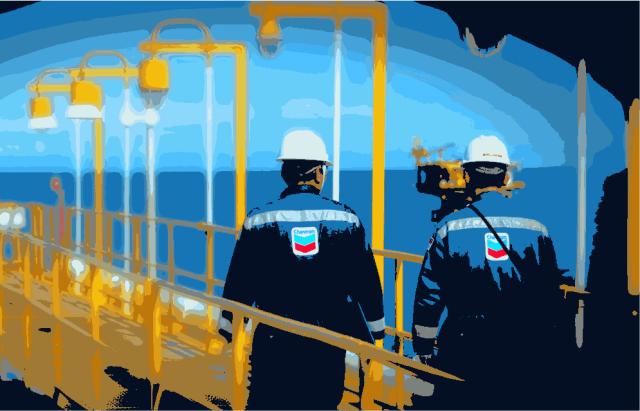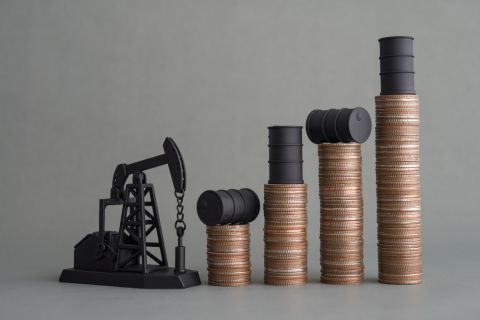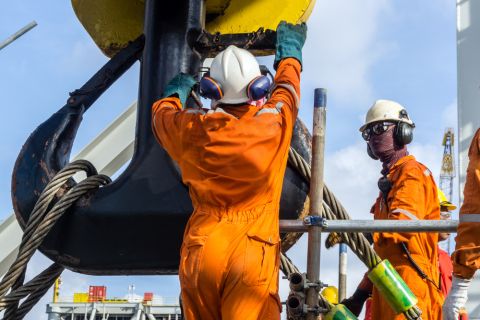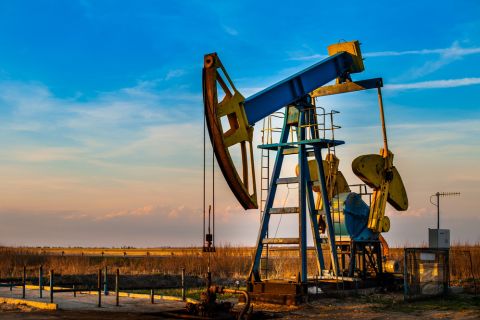
In addition to rich U.S. shale assets, the acquisition of Noble Energy adds long-term inventory of cleaner-burning natural gas in the East Mediterranean to Chevron’s upstream portfolio. (Source: Chevron Corp.)
Chevron Corp. made the first big M&A move of the crash, offering on July 20 to buy Noble Energy Inc. in a deal worth $13 billion, including debt. Financial Times spoke to Mike Wirth, Chevron’s CEO, and others, and have several takeaways.
Chevron has been rewarded for its patience. Just over a year after ending its interest in Anadarko Petroleum, Chevron is buying a producer with a similar profile—international gas assets plus rich U.S. shale assets—for much less. Occidental Petroleum Corp. took on huge debt to spend almost $60 billion buying Anadarko and its 1.4 billion boe reserves (end-2018). Chevron, by contrast, was paid $1 billion to walk away from that deal and has now picked up Noble Energy and its 2 billion boe for $13 billion. “We’re living in a different world,” Wirth said.
ESG was important, but not Chevron’s priority. The acquisition adds long-term inventory of cleaner-burning natural gas in the East Mediterranean, while building up Chevron’s short-term position in the fast-return shales of the Permian and Denver-Julesburg basins. Wirth said Noble’s emissions intensity (a measure of carbon pollution per unit of output) was less than Chevron’s: “So it moves us in the right direction there.” But Wirth was also clear: Environmental, social and governance (ESG) is just one metric Chevron uses to assess assets.
“If you over-index on financials alone, that’s not sustainable, because you’ll find yourself with an ESG equation that’s unacceptable [to investors]. … If you over-index on ESG, you may find you’ve got a financial situation that is unacceptable as well,” said Mike Wirth, chairman and CEO of Chevron.
More M&A is now likely. Consolidation is coming in the U.S. onshore. But while capital markets remain closed to U.S. independents, deep-pocketed majors will lead the charge. Analysts at Credit Suisse said shale players Pioneer Natural Resources Co., Parsley Energy Inc., Concho Resources Inc. and Cimarex Energy Co. were the most attractive targets. When he spoke to us on July 20, Wirth didn’t rule out further acquisitions—but said Chevron’s short-term priorities would be the company’s internal reorganization and integration of Noble. “Longer term, of course we’ll be looking,” he said.
Chevron has stepped into choppy geopolitical waters. The difficulty of doing business in Israel and the Gulf at the same time has deterred other supermajors from investing in the prolific Israeli offshore. Wirth would not say if he had gained assurances from Arab political leaders that Chevron’s interests elsewhere in the Middle East (including Saudi Arabia, Iraq and Qatar) would be unaffected. “We’re an honest broker, we’re a commercial actor, not a political actor.”
RELATED:
PATH FORWARD: Evercore’s James West on Chevron-Noble Energy Deal, Shale Outlook
Recommended Reading
Texas LNG Export Plant Signs Additional Offtake Deal With EQT
2024-04-23 - Glenfarne Group LLC's proposed Texas LNG export plant in Brownsville has signed an additional tolling agreement with EQT Corp. to provide natural gas liquefaction services of an additional 1.5 mtpa over 20 years.
US Refiners to Face Tighter Heavy Spreads this Summer TPH
2024-04-22 - Tudor, Pickering, Holt and Co. (TPH) expects fairly tight heavy crude discounts in the U.S. this summer and beyond owing to lower imports of Canadian, Mexican and Venezuelan crudes.
What's Affecting Oil Prices This Week? (April 22, 2024)
2024-04-22 - Stratas Advisors predict that despite geopolitical tensions, the oil supply will not be disrupted, even with the U.S. House of Representatives inserting sanctions on Iran’s oil exports.
Association: Monthly Texas Upstream Jobs Show Most Growth in Decade
2024-04-22 - Since the COVID-19 pandemic, the oil and gas industry has added 39,500 upstream jobs in Texas, with take home pay averaging $124,000 in 2023.
What's Affecting Oil Prices This Week? (Feb. 5, 2024)
2024-02-05 - Stratas Advisors says the U.S.’ response (so far) to the recent attack on U.S. troops has been measured without direct confrontation of Iran, which reduces the possibility of oil flows being disrupted.




